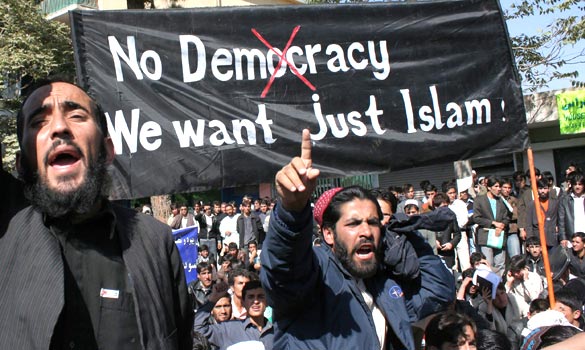Wishful Thinking?
"[....In] Pakistan the Islamization of this nation is based on persecution, hatred, inequality in law; and instead of democratization you have a nation where minorities reside in fear. It therefore appears that women can be gang raped in tribal areas in Pakistan; Christians can be killed for blasphemy; the Ahmadiyya face systematic persecution and mass hatred; the Shia are deemed un-Muslim by Sunni Islamic zealots; and terrorist attacks are frequent alongside a major drug problem."
"Yet what is the 92 per cent Muslim Pakistan? Well, it is like the virtual 100 per cent Muslim Afghanistan. That is, it is backward and going more backward and alongside institutional discrimination and hatred you have powerful Islamic movements in both societies which desire to turn both nations into 'year Mohammed'."
"In reality this means a fully fledged and barbaric Sharia Islamic state where apostates from Islam can be killed and women can be stoned to death like modern day Somalia."
Extracted from: Islamic Terrorism and Religious Persecution, Lee Jay Walker: Radical Islam and Terrorism
In that description of Pakistan it doesn't appear that the country and its Islamists can learn much from the Islamic State of Iraq and the Levant. Pakistan's hatred for India dominates its politics and its decision making on just about everything. Official Pakistan permits viral Islamism with all its vicious jihadist ideals to flourish unofficially, while it lends aid to the fanatics supported by Pakistan's military and Inter-Services Intelligence directorate in fomenting attacks against India.

So often when there are terrorist attacks against Western targets, Pakistani nationals will be involved even if they hold dual citizenship in other countries. Pakistan's relations with al-Qaeda through its surreptitious haven to Osama bin Laden, and its role in helping the Afghan Taliban to become a Sunni force that battled the Afghan Northern Alliance and won, to administer Afghanistan under Sharia is by now well acknowledged. That it continues to aid and assist the Islamists who prey on Afghanistan simply emphasizes Pakistan's own paranoid distrust of its neighbours.
The standoffs between Pakistan and its giant neighbour India within which a greater number of Muslims live with Indian citizenship than occupy all of Pakistan, is seen in the tinderbox of Kashmir. And it is particularly acute in potential danger to the two countries and by extension the rest of the world due to both being nuclear nations with stockpiles of nuclear weaponry. While it is highly unlikely that India, the world's largest democracy, would choose to be responsible for a 'first-strike', that potential is within the realm of possibility for Pakistan.
Atrocities with respect to the values of Islamism and the culture that arose from those values shock much of the world when it is revealed that imprisonment and sometimes death is seen as earned punishment for anyone 'insulting' Mohammad, the Koran, or Islam. That women can be raped with no consequence for the rapists, but the woman as a result, can be viewed as having had sex out of marriage can land her in prison and sometimes death.
The defence of what is perceived as tribal, clan or social honour is of utmost importance in a society such as Pakistan's, where a mother was recently reported to have murdered her 18-year-old daughter for purportedly bringing dishonour to the widowed mother, Parveen Rafiq when daughter Zeenat married a man she loved. "I have killed my daughter. I have saved my honour. She will never shame me again", shouted the mother from the rooftop of her house.
 |
| In this June 9, 2016 photo, Hassan Khan, whose wife Zeenat was killed by her mother, lays rose petals on her grave in Lahore, Pakistan. Zeenat was the third Pakistani girl reported to have died in the last month in what has widely come to be known as an "honor" killing. They are so named because the victim is accused by family, would-be suitors, and in one case a tribal council, of bringing shame or dishonor to their households. Those who kill for "honor" are almost never punished in Pakistan. A law based on Islamic Shariah allows the family of a victim to forgive a killer, and in these cases the killers are almost always family. (AP Photo/K.M. Chaudary) |
Parveen Rafiq first tried to choke her daughter to death and near succeeded, but decided to throw kerosene on her instead while she was weakened and dazed from lack of oxygen, then set her on fire. "Honour killings" in Pakistan are not uncommon; it is a country with one of the highest rates of this type of murder in the world. In 2014 three people daily were killed in brutal murders to restore "honour" to aggrieved families.
Despite which, some human rights activists believe that the younger generation of Pakistanis will reject the rigid authoritarianism and Sharia law of their elders. Over a thousand women, including 82 children, were killed in 2014, but that represents a documented number while the real number is held to be much higher. Even so, declared Marvi Sermid, a political commentator and women's rights activist: "The old order of misogyny and extremism is falling apart, is really crumbling".
At the same time, those who kill in the name of restoring "honour" rarely face judicial punishment in Pakistan. A Sharia-based law permits the family of a victim to forgive a killer. And since most of these cases involve another family member, the killer is forgiven and there is no penalty to be paid for the restoration of "family honour".
 |
| In this June 2, 2016 file photo, Sadaqat Abbasi, father of a female teacher who was beaten and set on fire, tries to comfort his daughters, in Upper Dewal, Pakistan. So called "honor" killings in Pakistan have grown in number and brutality, but activists see an increasing backlash. A younger generation has become bolder in denouncing the killings and other violence against women. (AP Photo/Muhammad Yousaf, File) |
Labels: Conflict, Female Subjugation, Islamism, Pakistan, Terrorism

<< Home